Regulierung internationaler Finanzmärkte und Banken
Die Forschungsgruppe "Regulierung internationaler Finanzmärkte und Banken" analysiert internationale Kapitalströme und die Auswirkungen von Regulierungsänderungen auf die Finanzstabilität. Integrierte Finanzmärkte begünstigen eine effiziente Kapitalallokation und Risikoteilung – sie erleichtern aber auch die grenzüberschreitende Übertragung von Schocks.
Dementsprechend hat sich die Bankenregulierung in den letzten Jahren weiterentwickelt, wobei die vollen Auswirkungen dieser Reformen noch unklar sind. Daher konzentriert sich die Forschung der Gruppe auf zwei Bereiche:
Erstens werden die Haupttreiber internationaler Kapitalströme und deren Auswirkungen auf Finanzstabilität untersucht. Zeiten hoher Finanzintegration sind oft gefolgt von Krisen mit nachhaltigen realwirtschaftlichen Folgen. Ziel ist es, zu verstehen, wie eine stabile und effektive Kreditvergabe gewährleistet werden kann.
Zweitens wird untersucht, wie sich Veränderungen in der Regulierung und Aufsicht auf das grenzüberschreitende Bankgeschäft auswirken, insbesondere im Kontext der europäischen Integration. Dazu gehört die Bewertung des Trade-offs zwischen regulatorischer Harmonisierung und unbeabsichtigten Marktverzerrungen.
Zwei Datenprojekte tragen zu diesen Forschungsthemen bei: die International Banking Library, eine webbasierte Plattform für den Forschungsaustausch mit einem vierteljährlichen Newsletter, der mehr als 700 Abonnenten erreicht, und die Financial Markets Directives Database, die die Umsetzung der wichtigsten EU-Vorschriften im Bereich Finanzmärkte mit besonderem Schwerpunkt auf der Europäischen Bankenunion dokumentiert. Gemeinsam fördern sie eine evidenzbasierte Politikanalyse und erhöhen die Sichtbarkeit der Gruppe.
Forschungscluster
Wirtschaftliche Dynamik und StabilitätIhr Kontakt

- Abteilung Finanzmärkte
PROJEKTE
10.2021 ‐ 06.2025
Distributional Effects of Macroeconomic Policies in Europe (DEMAP)
Leibniz-Gemeinschaft
Das Projekt untersucht wie politische Maßnahmen auf dem Level der Europäischen Union, wie zum Beispiel der European Recovery Fund, die Ungleichheit zwischen Haushalten beeinflusst.
07.2017 ‐ 12.2022
Die politische Ökonomie der europäischen Bankenunion
Europäischer Sozialfonds (ESF)
Ursachen für nationale Unterschiede in der Umsetzung der Bankenunion und daraus resultierende Auswirkungen auf die Finanzstabilität.
01.2015 ‐ 12.2017
Dynamic Interactions between Banks and the Real Economy
Deutsche Forschungsgemeinschaft (DFG)
Referierte Publikationen
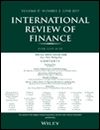
Monetary Policy through Exchange Rate Pegs: The Removal of the Swiss Franc-Euro Floor and Stock Price Reactions
in: International Review of Finance, Nr. 4, 2021
Abstract
The Swiss National Bank abolished the exchange rate floor versus the Euro in January 2015. Using a synthetic matching framework, we analyze the impact of this unexpected (and therefore exogenous) policy change on the stock market. The results reveal a significant level shift (decline) in asset prices following the discontinuation of the minimum exchange rate. As a novel finding in the literature, we document that the exchange‐rate elasticity of Swiss asset prices is around −0.75. Differentiating between sectors of the Swiss economy, we find that the industrial, financial and consumer goods sectors are most strongly affected by the abolition of the minimum exchange rate.

Macroprudential Policy and Intra-Group Dynamics: The Effects of Reserve Requirements in Brazil
in: Journal of Corporate Finance, December 2021
Abstract
<p>We examine whether liquidity dynamics within banking groups matter for the transmission of macroprudential policy. Using matched bank headquarters-branch data for identification, we find a lending channel of reserve requirements for municipal branches whose headquarters are more exposed to the policy tool. The result is driven by the 2008–2009 crisis and is stronger for state-owned branches, especially when being less profitable and liquidity constrained. These findings suggest the presence of cross-regional distributional effects of macroprudential policies operating via internal capital markets.</p>

Global Syndicated Lending during the COVID-19 Pandemic
in: Journal of Banking and Finance, December 2021
Abstract
This paper examines the pricing of global syndicated loans during the COVID-19 pandemic. We find that loan spreads rise by over 11 basis points in response to a one standard deviation increase in the lender's exposure to COVID-19 and over 5 basis points for an equivalent increase in the borrower's exposure. This implies excess interestof about USD 5.16 million and USD 2.37 million respectively for a loan of average size and duration. The aggravating effect of the pandemic is exacerbated with the level of government restrictions to tackle the virus's spread, with firms’ financial constraints and reliance on debt financing, whereas it is mitigated for relationship borrowers, borrowers listed in multiple exchanges or headquartered in countries that can attract institutional investors.
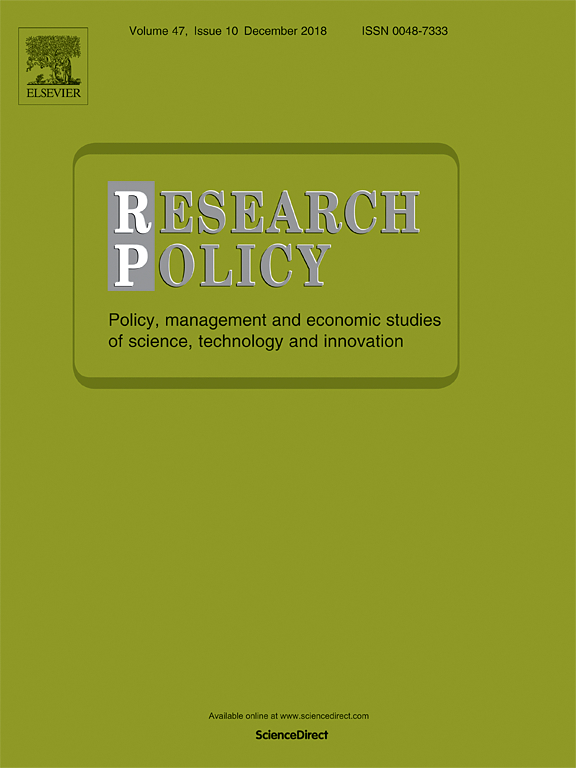
Does Gender Affect Innovation? Evidence from Female Chief Technology Officers
in: Research Policy, Nr. 9, 2021
Abstract
In this paper, we examine the impact of female Chief Technology Officers (CTOs) on corporate innovation. We find that firms with female CTOs are more innovative (as captured by both patent counts and patent citations) than firms with male CTOs. This effect is more pronounced for firms with a stronger innovation-supportive culture, firms with female CEOs, and when female CTOs are more powerful. Using mediation analyses, we further validate that female CTOs’ transformational leadership style is a plausible mechanism through which they affect innovation positively.
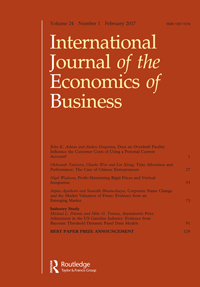
Quid Pro Quo? Political Ties and Sovereign Borrowing
in: Journal of International Economics, November 2021
Abstract
Do stronger political ties with a global superpower improve sovereign borrowing conditions? We use data on voting at the United Nations General Assembly along with foreign aid flows to construct an index of political ties and find evidence that suggests stronger political ties with the US is associated with both better sovereign credit ratings and lower yields on sovereign bonds especially among lower income countries. We use official heads-of-state visits to the White House and coalition forces troop contributions as additional measures of the strength of political ties to further reinforce our findings.
Arbeitspapiere
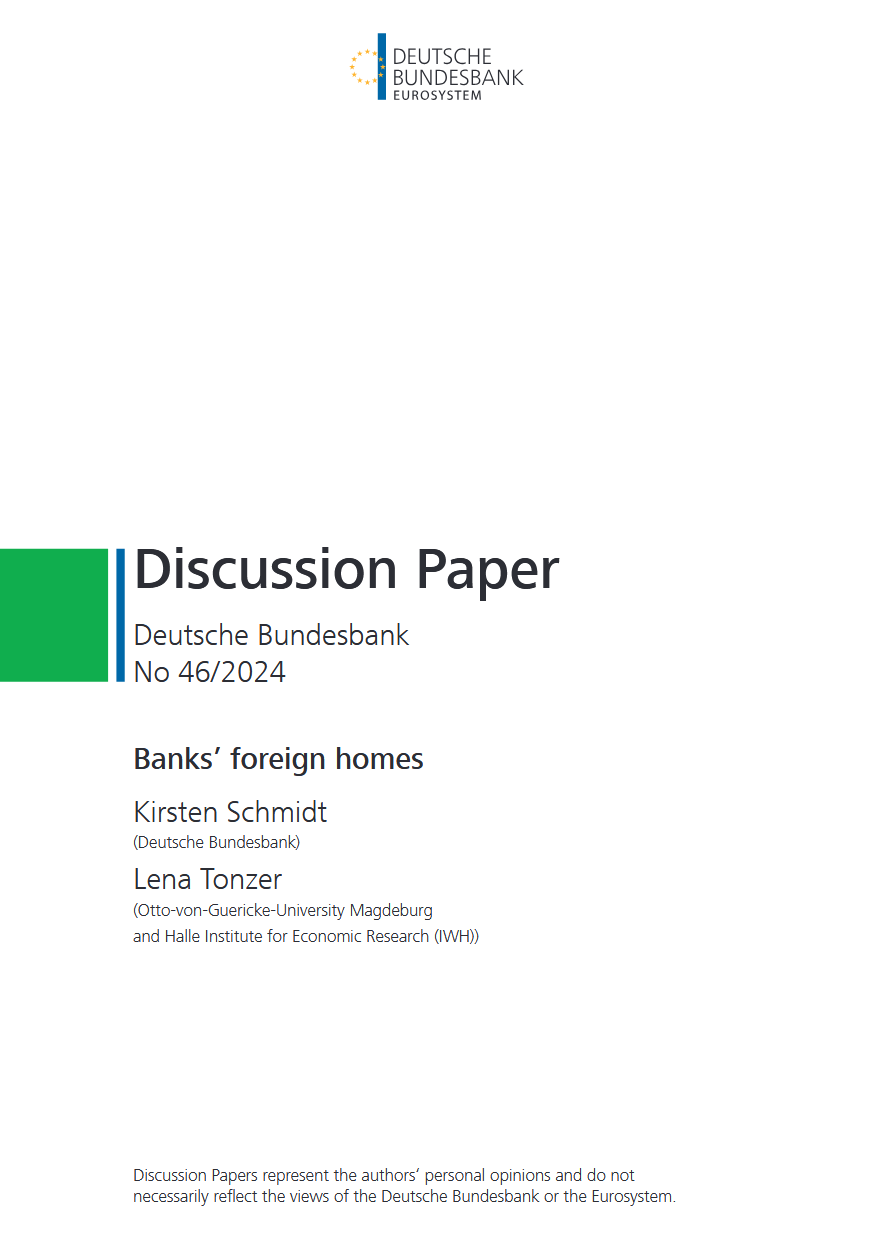
Banks’ foreign homes
in: Deutsche Bundesbank Discussion Papers, Nr. 46, 2024
Abstract
<p>Our results reveal that higher lending spreads between foreign and home markets redirect real estate backed lending towards foreign markets offering a higher interest rate, which provides evidence for "search for yield" behavior. This re-allocation is found especially for banks with more expertise on the foreign market due to a higher local activity and holds for commercial and residential real estate backed loans. Furthermore, "search for yield" behavior and a resulting increase in foreign real estate backed lending is found when macroprudential regulation is missing or misaligned between a bank’s country of residence and the destination country. When turning to the question of whether the detected search for yield behavior results in more risk, we find that especially better capitalized banks report higher forbearance ratios as they might face less stigma effects compared to low capitalized banks.</p>
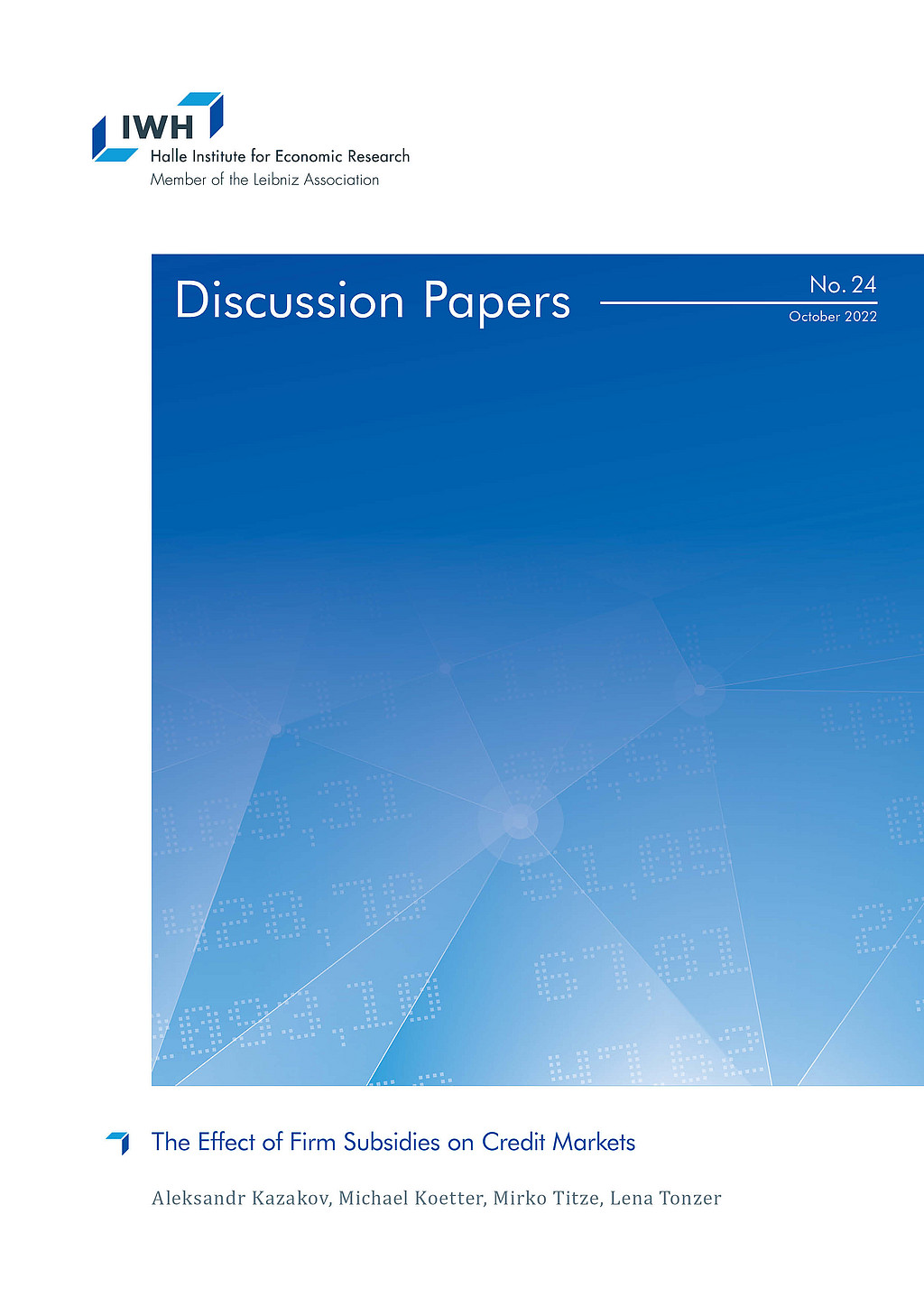
The Effect of Firm Subsidies on Credit Markets
in: IWH Discussion Papers, Nr. 24, 2022
Abstract
<p>We use project-level information for the largest regional economic development program in German history to study how government subsidies to firms affect credit markets. We identify credit market responses by considering both, bank lending and firm borrowing during 1998-2019. We find that subsidies lead to larger lending volumes without crowding out credit to non-subsidized firms. Banks that are more exposed to subsidized firms exhibit moderately higher credit risk though. Firm subsidies support lending especially when credit constraints are elevated during the years of the financial crisis.</p>
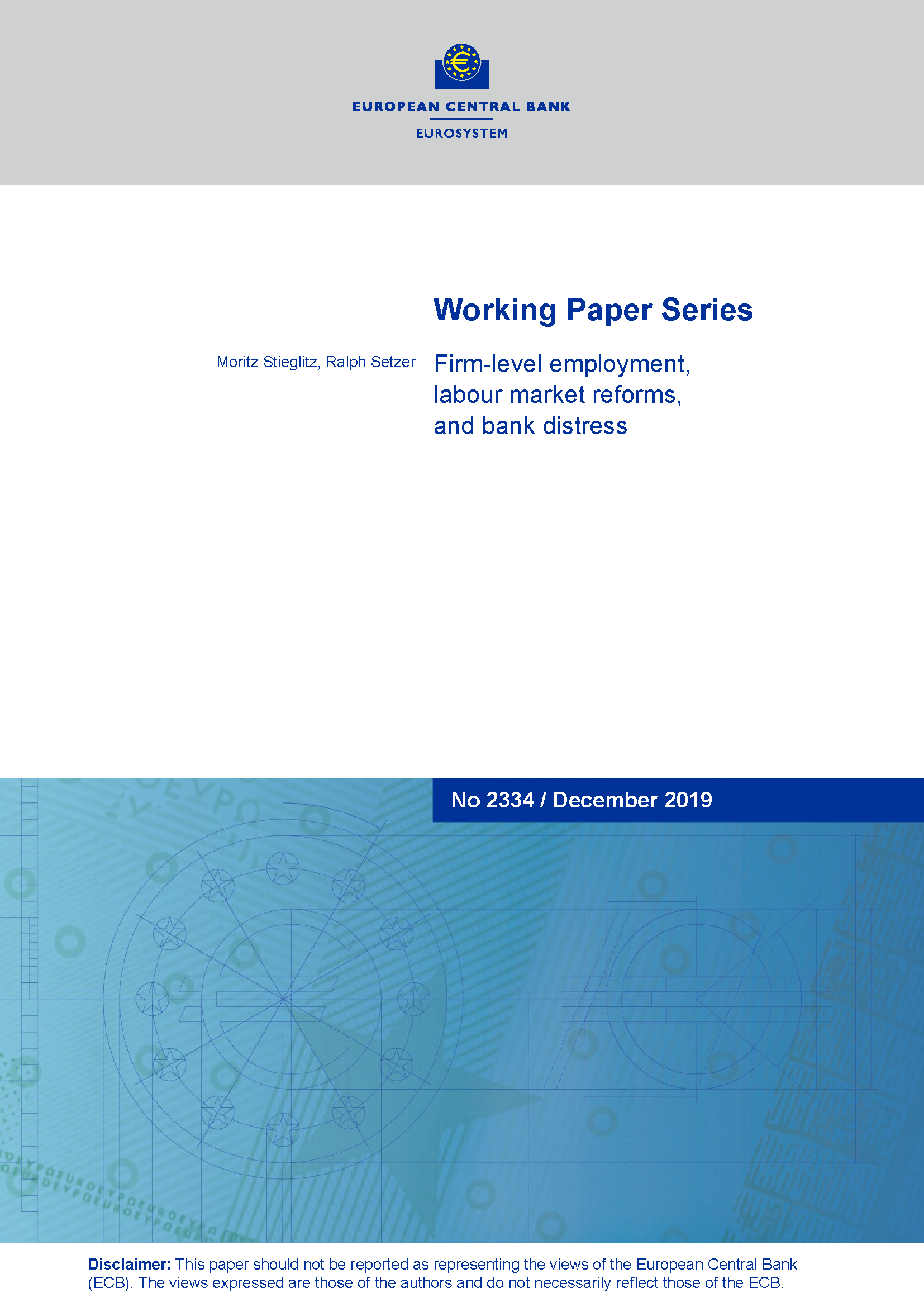
Climate Change-Related Regulatory Risks and Bank Lending
in: ECB Working Paper, Nr. 2670, 2022
Abstract
We identify the effect of climate change-related regulatory risks on credit real-location. Our evidence suggests that effects depend borrower's region. Following an increase in salience of regulatory risks, banks reallocate credit to US firms that could be negatively impacted by regulatory interventions. Conversely, in Europe, banks lend more to firms that could benefit from environmental regulation. The effect is moderated by banks' own loan portfolio composition. Banks with a portfolio tilted towards firms that could be negatively a affected by environmental policies increasingly support these firms. Overall, our results indicate that financial implications of regulation associated with climate change appear to be the main drivers of banks' behavior.
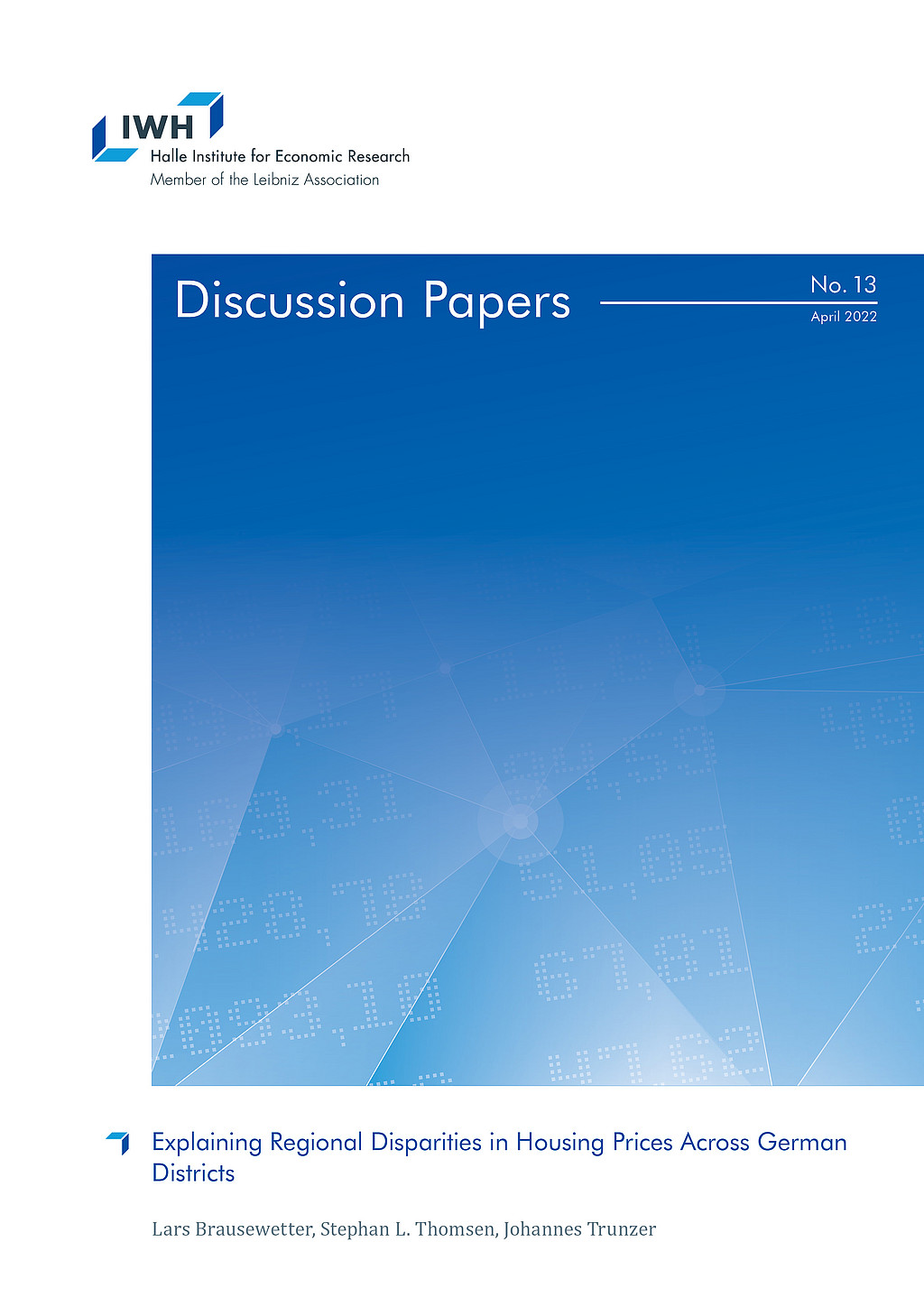
Explaining Regional Disparities in Housing Prices Across German Districts
in: IWH Discussion Papers, Nr. 13, 2022
Abstract
Over the last decade, German housing prices have increased unprecedentedly. Drawing on quality-adjusted housing price data at the district level, we document large and increasing regional disparities: Growth rates were higher in 1) the largest seven cities, 2) districts located in the south, and 3) districts with higher initial price levels. Indications of price bubbles are concentrated in the largest cities and in the purchasing market. Prices seem to be driven by the demand side: Increasing population density, higher shares of academically educated employees and increasing purchasing power explain our findings, while supply remained relatively constrained in the short term.
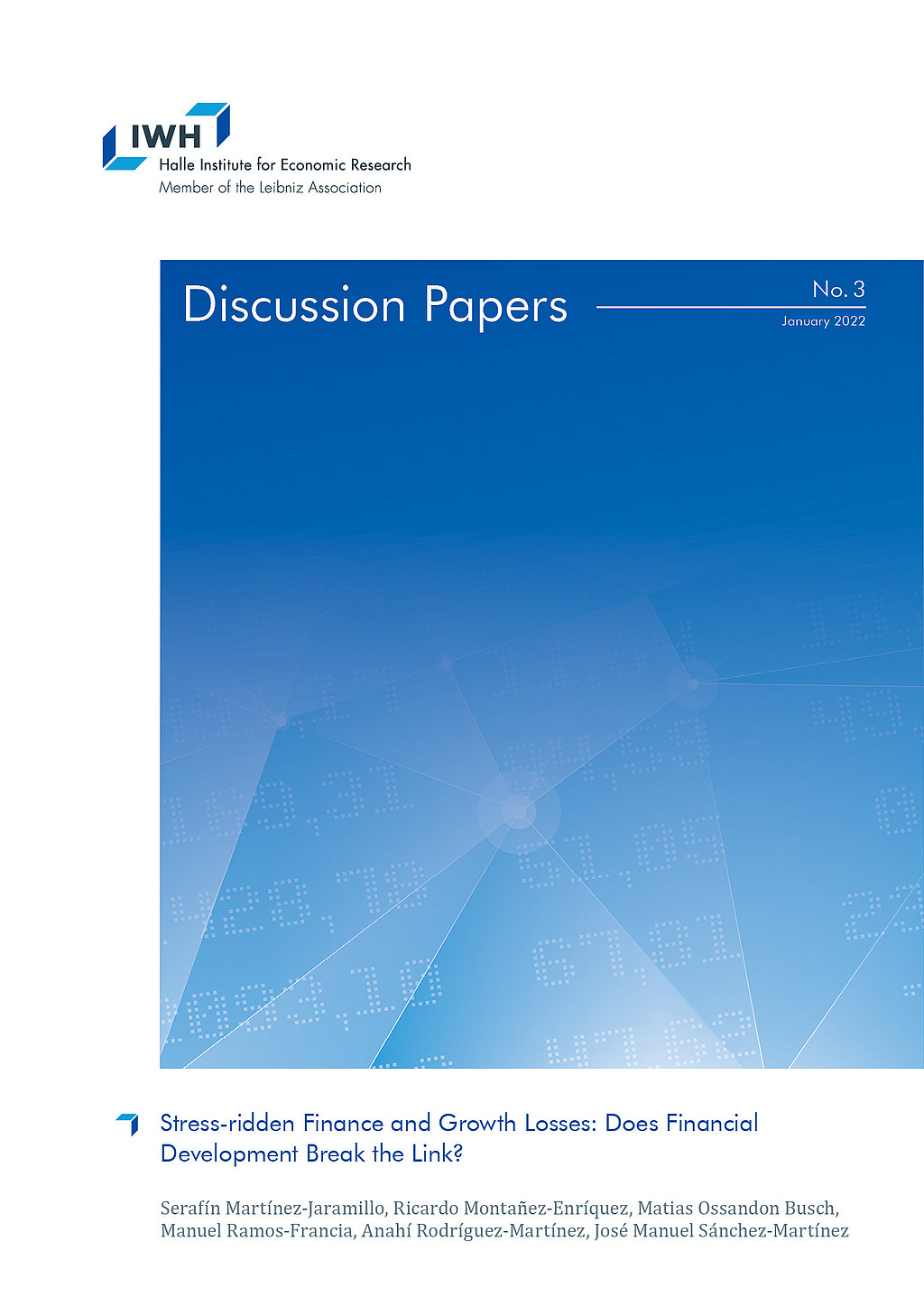
Stress-ridden Finance and Growth Losses: Does Financial Development Break the Link?
in: IWH Discussion Papers, Nr. 3, 2022
Abstract
Does financial development shield countries from the pass-through of financial shocks to real outcomes? We evaluate this question by characterising the probability density of expected GDP growth conditional on financial stability indicators in a panel of 28 countries. Our robust results unveil a non-linear nexus between financial stability and expected GDP growth, depending on countries’ degree of financial development. While both domestic and global financial factors affect expected growth, the effect of global factors is moderated by financial development. This result highlights a previously unexplored channel trough which financial development can break the link between financial (in)stability and GDP growth.















